Back to Journals » International Journal of Women's Health » Volume 13
Knowledge and Attitude Towards the Current Pandemic Corona Virus Disease and Associated Factors Among Pregnant Women Attending Antenatal Care in Debre Tabor General Hospital Northwest Ethiopia: An Institutional-Based Cross-Sectional Study
Authors Degu A , Nibret G , Gebrehana H , Getie A, Getnet B
Received 9 October 2020
Accepted for publication 30 November 2020
Published 8 January 2021 Volume 2021:13 Pages 61—71
DOI https://doi.org/10.2147/IJWH.S285552
Checked for plagiarism Yes
Review by Single anonymous peer review
Peer reviewer comments 3
Editor who approved publication: Dr Everett Magann
Alemu Degu, Gedefaye Nibret, Habtamu Gebrehana, Adanech Getie, Bekalu Getnet
College of Health Sciences, Debre Tabor University, Debre Tabor, Ethiopia
Correspondence: Alemu Degu Email [email protected]
Purpose: The current emerging respiratory disease known as the novel Coronavirus 2019 (COVID-19) is now an international concern and a pandemic with non-availability of treatment. Due to altered physiology, weakened mechanical and immunological features pregnant mothers constitute a particularly suspectable segment of population in any infection pandemic. The goal of this study was to assess level of knowledge and attitude towards COVID-19 and determinants among pregnant mothers attending antenatal care (ANC) in Debre Tabor General Hospital Northwest Ethiopia.
Patient and Methods: An institutional-based cross-sectional study was performed from June 05 to 26, 2020. A total of 403 pregnant mothers participated and were selected by systematic random sampling. Data were collected via face-to-face interviewer-administered questionnaire. Data were entered using Epi-Data version 4.2 and analyzed by SPSS version 23. Bivariable and multivariable logistic regression analysis was performed and p-value < 0.05 at 95% CI was considered as statistically significant.
Results: Overall, 52.1% and 52.6% of participants had a good level of knowledge and positive attitude towardCOVID-19, respectively. Level of knowledge was significantly associated with participants’ age (15– 24 years) (AOR: 4.58; 95% CI: 1.721– 12.201), educational status (AOR:7.78; 95% CI: 2.31– 15.65) occupation (AOR:2.26; 95% CI: 1.23– 4.15), and condition of pregnancy (AOR:4.55; 95% CI: 1.84– 11.25). Whereas age (25– 34 years) (AOR:2.61; 95% CI: 1.23– 5.55), participants husband completed secondary education (AOR=2.75, 95% CI: 1.13– 6.70) and college and above (AOR:3.77; 95% CI: 1.1.62– 8.76), wanted pregnancy (AOR:2.70; 95% CI: 1.22– 5.97) and knowledge (AOR:1.65; 95% CI: 1.06– 2.572) were the significant predictors for attitude.
Conclusion: Findings show that almost half of the participants had a good level of knowledge and positive attitude towards COVID-19. Age, educational status, occupational status, condition of current pregnancy was positively associated with women level of awareness of COVID-19. Additional research is needed to see the impact of COVID-19 on pregnancy and feto-maternal effect.
Keywords: attitude, COVID-19, Debre Tabor, knowledge, pregnant women
Introduction
COVID-19 is a newly emerged respiratory illness that is produced by a novel corona virus, which are single-stranded RNA viruses.1 The word 2019 novel corona virus was used by the World Health Organization (WHO) to refer to a virus that influenced the lower respiratory tract of patients with pneumonia.2 The virus constitutes the greatest genome of all RNA viruses and this virus is highly contagious, and fever, dry cough, fatigue, myalgia, and dyspnea were its major clinical manifestation.3–5
The outbreak was first identified in December 2019 in Wuhan City, China.6 On January 30, 2020 and 11 March 11, 2020 the disease was announced as a public health crisis of international importance, and a pandemic by WHO, respectively.1 This contagious disease can be spread from infected individuals to healthy ones via respiratory droplet, hand shake, and fecal-oral, and it has an incubation time of 2–14 days, but an infected individual can transmit the virus just before they clinically manifest the disease.7–9
Globally COVID-19 pandemic is now creating tremendous social and economic burden on the health care system.10 Currently the pandemic is affecting around 213 countries all over the globe and 2 international conveyances with total cases of 10,249,741, deaths 504,490, recovered 5,557,974, active cases 4,187,277 and seriously critical 57,347. Of those, 385,219 cases and 9698, deaths were in Africa.11 More than 100 million women globally are pregnant at the movement and nearly all of them are at a risk of transmitting the virus.12 In every contagious disease outbreak pregnant mothers are especially susceptible, because of their impaired physiology and vulnerability to infection.13,14
Since the health care systems of Africa are ineffective, challenges such as lack of facilities and resources, inappropriate training of health care staff and unreliable data communication, specialists have concerns about corona virus propagation to the continent and it was anticipated it would be hard to keep the outbreak under control.15,16
Ethiopia is one the African countries with scarce human and technological assets that are prone to be affected by the current corona virus outbreak.17 Although the government is highly dedicated to control the outbreak before it brings major harm to the population, the incidence of the virus is continuously accelerating every day.
Importantly as of 31 July, a total of 422,354 samples have been tested and 17,530 were corona virus confirmed cases. Of these cases 6950 people have recovered, 274 deaths, 138 people were reported to be in critical condition. Similarly, 1134 people (442 in hotels in Addis Ababa, 220 in Addis Ababa University and 321 in regional quarantines) were under mandatory quarantine at designated hotels and selected sites in the country. A total of 14,269 people, having completed the 14-day follow-up, have been discharged from quarantine.18
WHO recommended that necessary safety measures and interventions must be taken to reduce the possibility of the disease being propagated from region to region.19 At the same time WHO also highly recommend a variety of preventive steps including daily hand washing with water and soap, hand rubbing with alcohol-based sanitizers, social distancing, covering hand and mouth during coughing and stopping eyes, nose and mouth touching.20
Even though COVID-19 is highly contagious and results in many deaths in the world, currently there is no antiviral treatment or vaccine that has been specifically suggested for the virus. Thus, the most important action is to implement protective actions to handle COVID-19 transmission by raising the level of awareness and creating positive attitudes. In Ethiopia there is no study conducted on this issue yet.
Therefore, the goal of this study was to determine the level of knowledge and attitude towards COVID-19 and its determinants among pregnant mothers attending antenatal care (ANC) in Debre Tabor General Hospital Northwest Ethiopia.
Methods
Study Design and Setting
An institution-based cross-sectional study was performed in Debre Tabor General Hospital from June 05–26, 2020. Debre Tabor General Hospital is located in Debre Tabor Town, South Gondar district of Amhara Regional state which is about 665 kilometers away from Addis Ababa (capital city of Ethiopia) in a Northwest direction and 103 kilometers from Bahir Dar. The Hospital provides community care including maternal and child health services. All pregnant women who had ANC follow-up for current pregnancy in the hospital during the study periods were the study population. Pregnant women who have given informed consent to take part in the study and had ANC follow-up at the hospital were included; while pregnant mothers who has mental problems, hearing difficulty, or were critically ill were excluded from the study.
Sample Size and Sampling Procedure
The sample size was determined by using single proportion formula with the assumption of proportion of awareness and attitude towards COVID-19 was 50% due to lack of related studies in Ethiopia, margin of error (d) 5%, and considering no response rate of 5%. The final sample size was 403. Systematic random sampling was applied to pick the study participants from antenatal clinic. Based on the hospital report on average 850 pregnant mothers attend the ANC clinic in each month. We computed the Kth interval, which was 2.1~2. Of the first two pregnant mothers, one mother was randomly selected by using lottery method. Subsequently, we selected and interviewed the study participants at every second interval until the required respondents were obtained.
Data Collection Procedure Quality Control
The information was gathered through face-to-face interview techniques using a structured and pretested questionnaire, by implementing all the necessary safety precautions of the outbreak. The questionnaire was first developed in English then converted to Amharic language for clarity and back to English for consistency by two separate language expert individuals who speak both English and Amharic fluently. The questionnaire was developed from WHO guidelines and literature in different parts of the world, and revised according to our setting. The questionnaire has four parts including socio-demographics, obstetrics, knowledge related, and attitude related characteristics. Pretest of the questionnaire was performed on 10% of the total respondents (42 pregnant women) in Gaffat health center near to the study setting and necessary adjustments and corrections like; wording, logical sequence and skip patterns were made immediately. The data were gathered by five diploma midwives who had previous experience of data collection and supervised by two trained BSc health professionals. Data collectors and supervisors were trained for one day on the objective of the study, data collection process, confidentiality and informed consent prior data collection. The completeness and consistency of data was cross-checked, cleaned and compiled on a daily basis by supervisors and principal investigator.
Operational Definitions
Knowledge of COVID-19
The knowledge level of the study participants was determined using 15 knowledge assessing questions. A value of 1 and 0 were given for each correct and incorrect answer, respectively and labeled as good and poor knowledge based on mean score. Those participants who scored greater than or equal-to the mean score were considered as having a good knowledge whereas those who score less than the mean score labeled as poor knowledge.
Attitude Towards COVID-19
Attitude of participant was also determined based on 6 attitude assessing questions and labeled as good and poor attitude based on mean score. Pregnant women who scored greater than or equal-to the mean score of attitude questions of COVID-19 were considered as having positive attitude; while those who scored less than the mean score were considered as having negative attitude.
Data Processing and Analysis
The collected data were encoded and entered in to Epi-Data version 4.2 then transferred to SPSS version 23 for analysis. Descriptive statistics including tables and percentages were used to explain the data.
Binary and a multivariable logistic regression analyses were conducted. Variables that showed association in binary logistic regression analysis and which had P-value less than 0.20 were entered into multivariable logistic regression analysis model by controlling the potential confounding factors. At the end significant association was announced depending on p<0.05 and adjusted odds ratio (AOR) with 95% CI.
Ethical Consideration
Ethical clearance was obtained from the Institutional Ethics Review Committee of Debre Tabor University. Beside this, a support letter was issued from Debre Tabor Hospital. Written informed consent was gained from each study participant after explaining of the purpose of the study. To keep their privacy and assure confidentiality of the respondents, any personal identifiers were omitted and all information were anonymous. This paper was in compliance with the principles enunciated in the declaration of Helsinki.
Results
Socio-Demographic Characteristics
A total of 403 pregnant mothers were enrolled with response rate of 99%. Of those respondents more than half of them 227 (56.9%) were in to the age group of 25–34 years, the study population age ranged from 20–38 years with the mean age of 27.19 (SD± 4.72) years. Majority of the respondents, 390 (97.3%) and 365 (91.4%) were Amhara by ethnicity and Orthodox Christians, respectively. About 392 (98.2%) of the women were married and 173 (43.4%) of women were housewives. About 196 (49.2%) and 213 (54.3%) of respondents’ husbands had completed college and above education (Table 1).
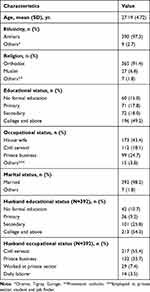 |
Table 1 Pregnant Mothers’ Distribution by Socio-Demographic Characteristics in Debre Tabor General Hospital, Debre Tabor, Northwest Ethiopia, June, 2020 (N=399) |
Obstetric and Reproductive Health Characteristics
Among the total respondents, two hundred fifty (62.7%) and one hundred sixty-one (40.4%) were multigravida and multipara respectively. Concerning to the number of children two hundred seventy-nine (69.9%) mothers has less than or equals to 3 alive children. Three hundred twenty-five (81.4%) of the current pregnancy were wanted and planned (Table 2).
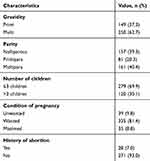 |
Table 2 Obstetric and Reproductive Health Characteristics of Pregnant Mothers in Debre Tabor General Hospital, Debre Tabor, Northwest Ethiopia, June, 2020 (N=399) |
Knowledge of Study Participants About COVID-19
Almost all of the respondents 399 (100%) mentioned that they had ever heard about COVID-19. The primary source of information was mass media 304 (76.2%), health worker 93 (23.3%), social media 48 (12.0%) and others (like friends and colleagues) 16 (4.0%). The two most frequent manifestation reported by the pregnant mothers were fever 291 (72.9%) and dry cough 229 (57.4%). Our study showed that 52.1% with 95% CI of (47.1–57.1) of respondents had a good knowledge about COVID-19 (Table 3).
 |
Table 3 Knowledge of Pregnant Mothers Toward COVID-19 in Debre Tabor General Hospital, Debre Tabor, Northwest Ethiopia, June, 2020 (N=399) |
Attitudes of Study Participants Towards COVID-19
Most of the respondents had a positive attitude toward various elements of attitude measuring questions. According to this study, 210 (52.6%) with 95% CI of (47.6–57.4) of participants had positive attitude towards COVID-19 (Table 4).
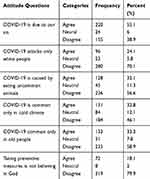 |
Table 4 Attitude of Pregnant Mothers Toward COVID-19 in Debre Tabor General Hospital, Debre Tabor, Northwest Ethiopia, June, 2020 (N=399) |
Predictors of Participants’ Knowledge About COVID-19
In binary logistic regression age, educational status, occupation, husband educational status, husband occupational status and condition of current pregnancy, had a significant association with knowledge of COVID-19. The multivariable logistic regression analysis showed that age, educational status, occupation and condition of current pregnancy were statistically significant with the women’s knowledge about COVID-19.
Respondents whose age ranged from 15–24 years were 4.58 times more likely to have a good level of knowledge about COVID-19 (AOR: 4.58; 95% CI: 1.72–12.20) than respondents whose age was higher than or equal- to 35 years. Compared to those who did not attend formal education, pregnant women who attended college and above were nearly eight times more likely to have a good level of knowledge about COVID-19 (AOR: 7.78; 95% CI: 2.31–15.65). Respondents who were civil servants by occupation were two times more likely to have good level of knowledge about the corona virus pandemic (AOR: 2.26; 95% CI: 1.23–4.15) than house wives. In addition, pregnant women whose pregnancy was wanted were 4.55 times higher odds of having good level of knowledge about COVID-19 (AOR: 4.55; 95% CI: 1.84–11.25) as compared to those whose pregnancies were unwanted (Table 5).
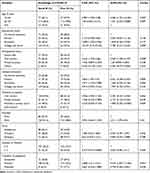 |
Table 5 Bivariable and Multivariable Analysis of Factors Affecting Knowledge of Pregnant Women About COVID-19 in Debre Tabor General Hospital, Debre Tabor, Northwest Ethiopia, June, 2020 (N=399) |
Predictors of Respondents’ Attitude Towards COVID-19
The finding of binary logistic regression analysis indicated that the important predictors of pregnant women attitude towards corona virus disease were, age, educational status, occupational status, husband educational status, husband occupational status, existing pregnancy status and knowledge of COVID-19. But the result of multivariable binary logistic regression analysis showed that age, husband educational status, status of existing pregnancy and knowledge of COVID-19 were statistically significant with pregnant women’s attitude towards COVID-19 infection.
Respondents whose age was ranged from 25–34 years were 2.61 times higher the odds of positive attitude towards corona virus disease (AOR: 2.61; 95% CI: 1.23–5.55) than respondents whose age lies higher than or equals to 35 years.
Participants whose husband has completed secondary education were nearly three times more likely to have positive attitude (AOR:2.75; 95% CI: 1.13–6.70) than those whose husband had not attended formal education. Similarly, pregnant women whose husband had attended college and above were nearly four times more likely to have positive attitude towards COVID-19 (AOR:3.77; 95% CI: 1.1.62–8.76) as compared to those whose husband had not attended formal education.
Moreover, pregnant women whose pregnancy was wanted were nearly three times higher the odds of positive attitude towards COVID-19 (AOR: 2.70; 95% CI: 1.22–5.97) as compared to their counter parts. In addition, study participants who had good knowledge about COVID-19 were 1.65 times more likely to have positive attitude towards COVID-19 (AOR: 1.65; 95% CI: 1.06–2.572) as compared to participants who had poor knowledge (Table 6).
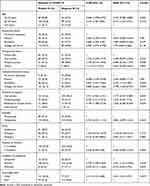 |
Table 6 Bivariable and Multivariable Analysis of Factors Affecting Attitude Towards COVID-19; Debre Tabor General Hospital, Debre Tabor, Northwest Ethiopia, June 05–26, 2020 (N=399) |
Discussion
To the best of our knowledge, this is the first study in Ethiopia investigating the knowledge and attitude towards COVID-19 among pregnant women. This study offers information on the level of knowledge and attitude towards coronavirus infection among pregnant mothers in Debre Tabor General Hospital at the time of the COVID-19 pandemic in Ethiopia.
Our study finding showed that almost all of the respondents had heard about corona virus pandemic. The result is in line with study conducted in Bangladesh.21 Mass media was the commonest source of information at 76.2%. Similarly, research performed in Kenya found that mass media was the key source of information about the outbreak.22
Fever and dry cough were the two most known manifestations of corona virus mentioned by the respondents. However, difficulty of breathing was not precisely mentioned as a main sign and symptom even if it indicates life threatening condition that needs hospitalization.23 This finding is consistent with the study performed at Egypt.24
According to our finding, almost half of the pregnant women (52.1%) had a good level of knowledge about the COVID-19 pandemic. This finding is higher than a study conducted in Egypt (16.39%).24 The possible explanation for the observed difference might be due to variation in study setting since the current study was completely conducted in urban setting where there is easy accessibility of mass media and social media exposure while, in Egypt 20.8% of the respondents were from rural setting.
On the contrary, previous studies from Iran (90%),25 Pakistan (93.2%),26 China (90%),27 and Tanzania (84.4%)28 reported higher than our finding. The difference may be associated with variations in socio-demographic characteristics, study setting and study participants. The other possible reason might be disparities in the presence of trained human resources and health care system of the countries to create awareness regarding to the pandemic.
The current study also attempted to determine respondents’ attitude towards COVID-19 and overall, 52.6% of the women has positive attitude towards COVID-19. This result is lower than a study conducted in Iran (90%).25 The probable reason might be because of variations in educational status of participants, since only 49.2% were attended college and above in this study; while in the comparable study 81.1% of respondents had attended college and above. The present finding is also lower than studies from India (97.33%),29 Bangladesh (62.3%),30 and Malaysia (83.1%).31 The most probable reason might be that there are discrepancies in socio-demographic characteristics, study setting and study participants. Infrastructure limitations like human power, media, and materials may also the other possible factors which indirectly affect the attitude.
This study noted that pregnant women who were in the 15–24 years of age group has improved knowledge regarding to corona virus compared to older ones above 35 years old. The finding is comparable with studies conducted in Malaysia,31 and Egypt.24 This might be due to quick access of data regarding to the outbreak through mass-media and social medias since they are deeply exposed to and intensively use these medias.
As mentioned elsewhere, mothers who attended college and above has good level of knowledge level about the pandemic than women who did not attend formal education.24,25,27 This outcome is also evident in the current study. Those respondents with college and above educational status were more knowledgeable than those with no formal education. This might be due to the fact that educated women are better subjected to various sources of information regarding to the diseases like Internet, Facebook and telegram. Additionally, educated individuals have also the ability to understand the information easily that they receive.
In addition, our study showed that being governmental employed increased the odds of having good a level of knowledge compared to house wives. According to our study finding occupation status was another predictor variable for knowledge as it stated that being a civil servant had good knowledge index. This is in agreement with a study from China.27 This might be explained by those government-employed respondents having higher educational achievement that positively affect their knowledge. In addition, employed women had easy access of information, strategies and interventions regarding to COVID-19 pandemic that are formulated by the government.
Besides this, the current finding also revealed that the status of current pregnancy was another significant factor for knowledge. Women whose pregnancy was wanted and planned were more likely knowledgeable than their counterparts. As far as our knowledge, this is a new finding that mentions status of current pregnancy as a predictor factor for knowledge of COVID-19 pandemic. The likely probable explanation might be women with wanted and planed pregnancy may have higher health care-seeking behavior, as early as possible including ANC follow-up which permits to get information and counseling regarding the outbreak, its main manifestation and possible prevention strategies by health care workers. At the same time unwanted and unplanned pregnancy may have psychological disturbance which may negatively influenced the entire wellbeing of the women.
Regarding to the attitude of pregnant women towards corona virus infection, those between age of 25–34 years has positive attitude towards the infection. Study from Iran was also comparable with our study finding.25 The underlying reason may be as the age increase the understanding and attitude of women becomes optimistic. In addition, this segment of women (25–34 years) may have steady life, higher educational attainment and regular job which positively affect their attitude.
Pregnant women whose husband completed secondary education and learned college and above has positive attitude regarding to the outbreak. This might be due to the fact that most women were affected by their husbands and as the educational level of the husband increase, they can get information simply and share more important topics clearly with their wife as they are nearer and more intimate to one another. As well, an educated husband may have better understanding regarding to complications and consequences associated with the outbreak thereby positively affecting his wife.
Similarly, this study also found that a significant relationship was observed between current condition of pregnancy and attitude of women towards COVID-19. Those respondents whose pregnancy was wanted has positive attitude towards the pandemic. The possible explanation might be due to the fact that unwanted and unplanned pregnancy has various impacts on women including psychological problems which negatively affects health-seeking behaviors.
Finally, our study noted that level of knowledge had a strong relationship with attitude regarding to the current corona virus pandemic. Those participants who were knowledgeable about the outbreak of corona virus had positive attitude concerning to it. Findings from Pakistan are also comparable with our result.26 The possible explanation may be that good and detailed knowledge of corona virus infection may scale-up women’s insight and awareness which might lead to positive attitude towards COVID-19.
As a limitation due to lack of specific study findings on the respondents’ (pregnant women) we try to discuss with other related findings. This may limit generalizability of the result.
Conclusion
The findings of the current study revealed that knowledge and attitude of women towards corona virus disease were 52.1% and 52.6%, respectively. Woman’s age, educational status, occupational status and status of current pregnancy were statistically significant with knowledge of COVID-19. In addition, age, husband educational status, condition of current pregnancy and knowledge were also the predictor variables for attitude towards the corona virus pandemic.
Recommendation
The authors recommend government, health workers and other stakeholders must give emphasis on regular health education program, advising and counseling a pregnant woman and the whole population regarding the spread, transmission and possible preventive strategies to battle the consequence of the outbreak. For researchers’ multidisciplinary team study approach, program assessments, and clinical study should be conducted to investigate and examine the consequence of the current corona virus pandemic on pregnancy and pregnancy outcomes.
Acknowledgments
We would like to forward our appreciation to Debre Tabor University for ethical approval the Debre Tabor Hospital for supplying all relevant data. In addition, we would also like to express our heart felt gratitude to all study respondents, data collectors and supervisors for their sincere involvement in this study.
Funding
The authors funded the study; no other organization funded this study.
Disclosure
The authors report no conflicts of interest for this work.
References
1. World Health Organization. Naming the coronavirus disease (COVID-19) and the virus that causes it. Available at: https://www.who.int/emergencies /diseases/novel-coronavirus- 2019/technical-guidance/namingthe- coronavirus-disease-(covid- 2019)-and-the-virus-that-causesit. Accessed January 5, 2021.
2. Center for disease control and Prevention. Novel coronavirus, Wuhan, China; 2020.
3. Lu R, Li J, Niu P, Yang B, Wu H. Genomic characterisation and epidemiology of 2019 novel coronavirus: implications for virus origins and receptor binding. Lancet. 2020;395:565–574.
4. The Novel Coronavirus Pneumonia Emergency Response Epidemiology Team. The epidemiological characteristics of an outbreak of 2019 novel coronavirus diseases (COVID-19) in China. Chin J Epidemiol. 2020;41:145–451.
5. Chen N, Zhou M, Dong X, et al. Epidemiological and clinical characteristics of 99 cases of 2019 novel coronavirus pneumonia in Wuhan, China: a descriptive study. Lancet. 2020;395: 507–513.
6. World Health Organzation. Global Surveillance for COVID-19 Disease Caused by Human Infection with Novel Coronavirus (COVID-19): Interim Guidance, 27 February 2020. Geneva: World Health Organization. Contract No.: WHO/2019-nCoV/SurveillanceGuidance/2020; 2020.
7. World Health Organization. Novel coronavirus (COVID-19) situation. Available from: https://experience.arcgis.com/experience/685d0ace521648f8a5beeeee1b9125cd. Accessed March 13, 2020.
8. Backer J, Klinkenberg D, Wallinga J. Incubation period of 2019 novel coronavirus (2019-nCoV) infections among travellers from Wuhan, China, 20–28 January 2020. Euro Surveill. 2020;25(5):2000062. doi: 10.2807/1560-7917.es.2020.25.5.2000062.
9. Li Q, Guan X, Wu P, et al. Early transmission dynamics in Wuhan, China, of novel coronavirus–infected pneumonia. New Engl J Medi. 2020;382:1199–1207. doi: 10.1056/NEJMoa2001316.
10. Shadmi E, Chen Y, Dourado I, et al. Health equity and COVID-19: global perspectives. Int J Equity Health. 2020;19(1):1–6.
11. Reported Cases and Deaths by Country, Territory, or Conveyance; June 2020. Available from https://www.worldometers.info/coronavirus/?utm_campaign=homeAdvegas1?%22%20%5Cl%20%22#countries.
12. Khalil A, Hill R, Ladhani S, Pattisson K, O’Brien P. Severe acute respiratory syndrome coronavirus 2 in pregnancy: symptomatic pregnant women are only the tip of the iceberg. Am J Obstet Gynecol. 2020;223(2):296–297.
13. Liang H, Acharya G. Novel corona virus disease (COVID-19) in pregnancy: what clinical recommendations to follow? Acta Obstet Gynecol Scand. 2020;99(4):439–442. doi:10.1111/aogs.13836
14. Huijun C, Juanjuan G, Wang C, et al. Clinical characteristics and intrauterine vertical transmission potential of COVID-19 infection in nine pregnant women: a retrospective review of medical records. Lancet. 2020;395(10226):809–815
15. Jump up to: ab c d African Countries Respond Quickly To Spread Of COVID-19. NPR.org; March 23, 2020.
16. Maclean R. Africa braces for coronavirus, but slowly. The New York Times. 2020.
17. Tolu LB, Ezeh A, Feyissa GT. How prepared is Africa for the COVID-19 pandemic response? The case of Ethiopia. Risk Manag Healthc Policy. 2020;13:771–776.
18. UNICEF. Ethiopia COVID 19 Situational Report No 15–16., July 31, 2020. Available from: www.unicefe.org.ethiopia/file/2020-08.
19. Updated, WHO. Advice for international traffic in relation to the outbreak of the novel coronavirus 2019-nCoV. World Health Organization; 2020 Available from: https://www.who.int/news-room/articles-detail/updated-who-advice-for-international-traffic-in-relation-to-the-outbreak-of-the-novel-coronavirus-2019-ncov-24-jan.
20. Abdo R, Endalemaw T, Tesso F. Prevalence and associated factors of adverse birth outcomes among women attended maternity ward at Negest Elene Mohammed Memorial General Hospital in Hosanna Town, SNNPR, Ethiopia. J Womens Health Care. 2016;5(4).
21. Abdul K, Mursheda K. Knowledge and perception towards novel coronavirus (COVID 19) in Bangladesh. MPRA; March 20, 2020. Available from: https://mpra.ub.uni-muenchen.de/99656/.
22. Austrian K, Pinchoff J, Tidwell JB, et al. COVID-19 related knowledge attitudes, practice and needs of households in informal settlments in Nairobi, Kenya. (preprint). Bull World Health Organ. 2020. doi:10.2471/BLT.20.260281
23. Centers for Disease Control and Prevention. COVID: what to do if you are sick 2020; April 3, 2020. Available from: https://www.cdc.gov/coronavirus/2019-ncov/if-you-aresick/steps-when-sick.html.
24. Samir A, Mohammed Z, Emad M, et al. Knowledge, perceptions, and attitude of Egyptians towards the novel coronavirus disease (COVID‑19). J Community Health. 2020. doi:10.1007/s10900-020-00827-7
25. Erfani A, Shahriarirad R, Ranjbar K, et al. Knowledge, Attitude and practice toward the novel coronavirus (COVID-19) Outbreak: a population-based survey in Iran. [Preprint]. Bull World Health Organ. 2020. doi:10.2471/BLT.20.256651.
26. Saqlain M, Muddasir M, Rehman S, et al. Knowledge, attitude, practice and perceived barriers among healthcare professionals regarding COVID-19: a cross-sectional survey from Pakistan. medRxiv. 2020. doi:10.1101/2020.04.13.20063198.
27. Liang B, Luo W, Mei H, et al. Knowledge, attitudes, and practices towards COVID-19 among Chinese residents during the rapid rise period of the COVID-19 outbreak: a quick online cross-sectional survey. Int J Biol Sci. 2020;16(10):1745–1752. doi:10.7150/ijbs.45221
28. Rugarabamu S, Ibrahim M, Byanaku A. Knowledge, attitudes, and practices (KAP) towards COVID-19: a quick-online cross-sectional survey among Tanzanian residents. medRxiv. 2020; 11(3):6–11. doi:10.1101/2020.04.26.20080820
29. Tomar BS, Singh P, Nathiya D, et al. Indian communitys knowledge, attitude & practice towards COVID-19. medRxiv. 2020.
30. Zannatul F, Islam MS, Sikder MT, et al. Knowledge, attitude, and practice regarding COVID-19 outbreak in Bangladesh: an online-based cross-sectional study. medRxiv. 2020;15(10):e0239254.doi:10.1101/2020.05.26.20105700
31. Anis A, Hamzah MR, Sern TJ, et al. Public knowledge, attitudes and practices towards COVID-19: a cross-sectional study in Malaysia. PLoS One. 2020;15(5):e0233668. doi:10.1371/journal.pone.0233668
 © 2021 The Author(s). This work is published and licensed by Dove Medical Press Limited. The full terms of this license are available at https://www.dovepress.com/terms.php and incorporate the Creative Commons Attribution - Non Commercial (unported, v3.0) License.
By accessing the work you hereby accept the Terms. Non-commercial uses of the work are permitted without any further permission from Dove Medical Press Limited, provided the work is properly attributed. For permission for commercial use of this work, please see paragraphs 4.2 and 5 of our Terms.
© 2021 The Author(s). This work is published and licensed by Dove Medical Press Limited. The full terms of this license are available at https://www.dovepress.com/terms.php and incorporate the Creative Commons Attribution - Non Commercial (unported, v3.0) License.
By accessing the work you hereby accept the Terms. Non-commercial uses of the work are permitted without any further permission from Dove Medical Press Limited, provided the work is properly attributed. For permission for commercial use of this work, please see paragraphs 4.2 and 5 of our Terms.
